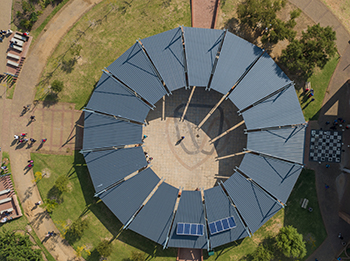Latest News Archive
Please select Category, Year, and then Month to display items
21 November 2024
|
Story Jacky Tshokwe
|
Photo Supplied
 Prof Mogomme Masoga, Dean: Faculty of the Humanities.
Prof Mogomme Masoga, Dean: Faculty of the Humanities.
On 8 November 2024, the South African Humanities Deans Association (SAHUDA) elected Prof Mogomme Masoga, Dean of the Faculty of The Humanities at the University of the Free State (UFS), as its new President. This appointment marks a pivotal moment for SAHUDA, which represents a diverse network of deans who champion the prominence and future of humanities, social sciences, and the arts in South Africa and beyond. Prof Masoga, who has served as Vice-President of SAHUDA for the past year, brings a wealth of experience and a deep commitment to advocating for the role of humanities in addressing the challenges of our contemporary world.
As President, Prof Masoga envisions broadening the influence of what he terms ‘public and applied humanities.’ His aim is to advance a humanities framework that not only enriches academic discourse, but also engages with critical global and local issues. This approach, rooted in socially responsive scholarship, will prioritise areas such as computational and digital humanities, environmental humanities, and other interdisciplinary fields that intersect with the pressing concerns of our time.
“The humanities are more relevant than ever to understanding complex societal issues,” Prof Masoga explained. “Through public and applied humanities, we can bring the critical perspectives of our field into active dialogue with the challenges of a digital and ecologically threatened world.”
His election underscores the University of the Free State's growing influence in national and international conversations about the future of the humanities. For the UFS, this leadership role enhances its reputation as an institution deeply invested in fostering meaningful contributions to society. Prof Masoga’s presidency is set to amplify the university’s voice and perspectives in SAHUDA’s mission to fortify the role of humanities in education and public life.
Over the next two years, Prof Masoga’s tenure will include a focus on initiatives that strengthen the relevance of humanities scholarship, encourage interdisciplinary research, and cultivate public engagement. He will also prioritise fostering collaboration across higher education institutions in South Africa and internationally to ensure that humanities disciplines are equipped to address the diverse needs of our rapidly evolving world.
Prof Masoga’s commitment to SAHUDA’s mission reflects the values and aspirations of the UFS Faculty of The Humanities. His presidency is an invaluable opportunity for the university to contribute to the national agenda of reinforcing the humanities as a field essential to a healthy, critically informed, and culturally aware society. This achievement serves as a proud moment for the UFS and a beacon for the potential of the humanities to drive societal progress in South Africa and beyond.
Renewable energy systems an economical investment for the UFS
2017-06-14

The Qwaqwa Campus Arena equipped with freestanding
roof solar panels.
Photo: iFlair Photography
Renewable energy systems are said to be very expensive to implement initially, but in the long run they provide high economic returns.
With their decision to install renewable energy, the University of the Free State Department of Facilities Planning has now also adopted this innovative technology. They have chosen less capital-intensive solar power-generating options to generate electricity in various buildings and parking areas on all three UFS campuses.
“As per the UFS Energy Management Policy, all designs incorporate efficient, renewable energy sources varying from LED lights to solar power,” says Anton Calitz, Electrical Engineer in University Estates’ Department of Facilities Management.
South Campus taking the lead in renewable energy usage
In December 2016, a total of 26 solar-driven LED street-light poles were installed at the recently built Legae Residence’s parking area and the perimeter security area on the South Campus. This low-maintenance system improves security after dark and is independent of the national power supply, which is an important advantage during power outages. With no requirements for major earthworks and cable setting, operational costs are reduced.
The recently built infrastructure also takes pride in being the first to have a greywater system installed. This system will also be installed at three other residences on the Bloemfontein Campus in 2017. Greywater is made up of bath, shower, and bathroom sink water. The water is reused for toilet flushing, as well as for irrigation purposes.
Various UFS electrical operations to depend on solar power
On the Bloemfontein and Qwaqwa Campuses, the computer laboratories as well as the Thakaneng Bridge Student Centre and the projected Afromontane Research Centre will be equipped with freestanding roof solar solutions during 2017. These systems are designed to operate independently of the power grid (Eskom).
The systems only operate during sunlight hours when the PV solar panels are heated by the sun, making them suitable for operations such as ventilation fans, water pumps, and small circulation pumps for solar thermal water-heating systems.